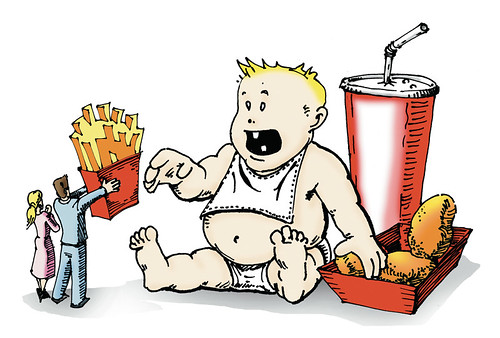We’ve all heard about the youth obesity epidemic, but sometimes I wonder if people grasp how serious it is.
Did you know that 20% of four-year-olds in the US are obese? 1 in 5 four-year-olds!
Now you may say that it’s just baby fat and that they’ll grow out of it, but here are some things you should know:
- 10% of non-obese children become obese adults
- 40%-50% of obese children become obese adults
- 70% of obese adolescents become obese adults
- 80% of obese adolescents become obese adults if one parent is obese
In addition to their weight itself, most obese children have at least one other major cardiovascular risk factor, (i.e. high blood cholesterol, high triglycerides, high insulin or high blood pressure). These risk factors were previously thought of as adult conditions, not ones you’d find in kids. Our children’s generation could be the first generation where the parents live longer than the kids do.
So who’s to blame? In my opinion, we all are. Parents, schools, the community, and society all carry the burden of what’s happening to our kids. We all need to step up and do our part to help overcome it.
What Parents Can Do
I’m a father myself (I have two boys, ages 9 and 11) and as parents, we make choices for our kids every day that influence how they will live their lives. Here are some suggestions for what I believe we, as parents, can do to keep our kids on the right path:
Change Behavior
- Be a Role Model. Walk the walk. What you do is more important than what you say.
- Be supportive and sensitive to your child’s needs.
- Don’t single out the child. Focus on the family.
- Don’t make food or exercise an issue.
Make Nutrition a Priority
- Don’t place your child on a restrictive diet. You could inhibit necessary development. (If he or she is obese, consult your physician and/or a registered dietitian.)
- Try not to use food to punish or reward your child.
- Don’t overly restrict sweets or treats.
- Teach your family healthy eating habits and involve them in meal preparation.
- Involve kids in food shopping. With programs like Guiding Stars – kids can easily spot nutritious foods by looking for the icons on the shelf tags. Foods marked with 1, 2, or 3 Guiding Stars have more vitamins, minerals, dietary fiber and whole grains.
- Carefully cut down on the amount of fat in your family’s diet.
- Eat as a family.
- Encourage your family to eat slowly.
- Provide delicious, healthful meals and snacks.
- Plan for snacks.
- Discourage eating meals or snacks while watching TV.
- Make sure your child’s meals outside the home are balanced.
Increase Physical Activity
- Increase your family’s physical activity. Schedule them regularly into your day. (i.e. after dinner walks).
- Encourage physical activities that children find enjoyable.
- Encourage after school and summer physical activity programs.
- Focus on fun, not on health or weight loss.
- Reduce the amount of time you and your family spend in sedentary activities, such as watching TV or playing computer/video games.
- Set appropriate limits that are consistently enforced.
Obviously these are just some options we can take as parents. I’ve created a resource page on overcoming childhood obesity to help motivate more people to take action. What are you doing to fight childhood obesity? Please share your comments below.
Mark Nutting, CSCS*D, NSCA-CPT-AR*D, National Strength and Conditioning Association’s 2009 Personal Trainer of the Year, holds 12 certifications in the field and has 30 years experience in personal training. A national presenter and an educator of Personal Trainers, Mark’s areas of expertise include weight loss, post-rehab conditioning, and brain fitness. Mark contributes regularly to the Guiding Stars Blog.
